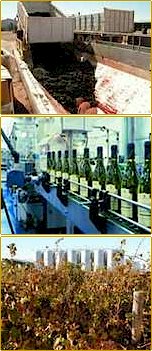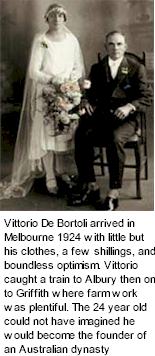


The winemaking team is overseen by third generation winemaker Darren De Bortoli and his brother-in-law Steve Webber who is married to Leanne De Bortoli. The dynamic duo has been responsible for many winemaking innovations and developments. Darren De Bortoli is the creator of the world acclaimed Noble One. Steve Webber, recently awarded Gourmet Traveller WINE's 2007 Winemaker of the Year, established the Yarra Valley winery, the King Valley vineyards and oversees the Hunter Valley winery and vineyards.

The winemaking philosophy is that great wine begins in the vineyard and that the winemaker should use minimal handling and interference in the winery. Wine should have a sense of regionality and be an expression of the soil in which it is grown. Our winemakers strive to create wines that they find interesting and exciting - wines that may be quirky or unusual but wines that above all have provenance and a sense of place.
De Bortoli has wineries in diverse wine growing regions, each with its own regional style, as well as vineyards in the King Valley. The Bilbul winery in the Riverina, famous for the iconic dessert wine Noble One, also produces world class fortified wines and premium varietal and sparkling wines. The region enjoys a warm Mediterranean climate with winter dominant rainfall. The sandy loam soils vary in colour and structure from red sandy earths to brown clay loams. Bilbul plays a leading role in sustainability with a detailed action plan in place addressing water recycling, waste control, greenhouse gas emissions and other key environmental issues.
In 1987 the De Bortoli family purchased a winery and vineyard in the prestigious, cool-climate Yarra Valley region to establish a premium wine brand for the company. Leanne De Bortoli and her husband winemaker Steve Webber moved to the Valley in 1989 and built the Winery & Restaurant complex that launched the new De Bortoli Yarra Valley label in 1990. From a crush of just 35 tonnes in 1989, De Bortoli crushed 4214 tonnes in 2004 – 1987 tonnes of white grapes and 2226 tonnes of red grapes.

The De Bortoli Yarra Valley Chardonnay has won 19 Trophies and 45 Gold Medals since 1990 including Best Chardonnay at the International Wine & Spirit Competition in 2000 and has flown in First and Business Class on some of the world's great airlines. The Yarra Valley Pinot Noir is also making waves and has twice won the Trophy for Best Pinot Noir at the Sydney Wine Show. The Gulf Station and Windy Peak Pinot Noirs are widely regarded as representing outstanding quality and value. In 1997, De Bortoli won Australia's most prestigious award the Jimmy Watson Trophy for Yarra Valley Shiraz and in 2002, Gulf Station Riesling won three trophies at the Melbourne Wine Show. These are just a few of many highlights for De Bortoli Yarra Valley.
In 2002 the De Bortoli family added a Hunter Valley vineyard and winery to its ever-expanding portfolio. This was a strategic move to enable De Bortoli to produce premium wine from the renowned winemaking region, and increase the company's profile in Sydney and overseas markets. The Hunter Valley has deep historical significance being Australia's oldest wine growing region producing wines of a distinctive character and personality that complement the wines grown at De Bortoli's Yarra Valley and King Valley vineyards. The focus will be on the winestyles the Hunter has made famous, its unique Semillon and Shiraz that develop gracefully in the bottle as well as Chardonnay, Verdelho and Merlot.
The 26-hectare property includes an 800 tonne capacity winery and produces the De Bortoli Hunter Valley and Individual Vineyard series. The existing vineyard plantings of 19 hectares are in the process of being reorganised with some varieties not suited to the region being removed and replaced with more suitable varieties including classic Hunter stalwarts Semillon and Shiraz. De Bortoli purchased the adjoining 100 acre block with the view to future plantings and also another nearby vineyard with mature Semillon vines planted back in the 1960s.
